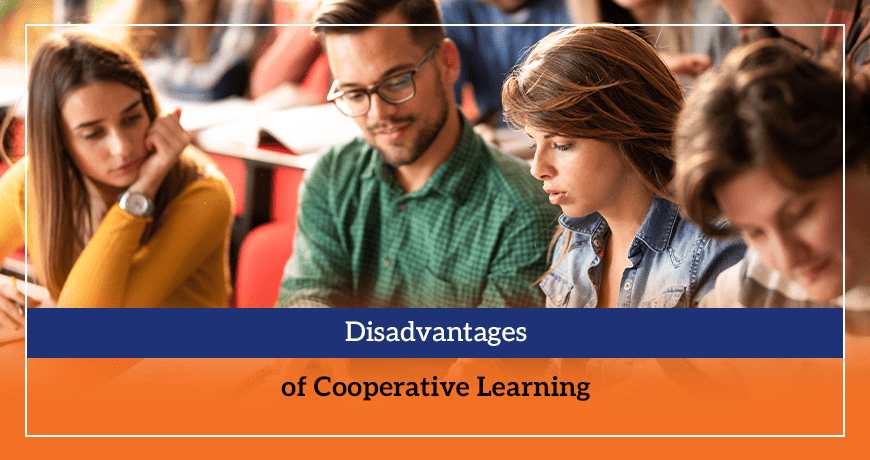Cooperate learning is an instructional method where a specific number of members work together to achieve a particular common goal or finish a task under the instruction of an experienced instructor. It helps group members improve their learning experience and social skills. The success of the group determines the success of each member.
However, while cooperative learning has many good sides, it may cause management and accountability issues. Hence, knowing the advantages and disadvantages of cooperative learning is crucial.
Advantages of Cooperative Learning
The importance of cooperative learning in our student and professional life is huge.
Enhanced Student Engagement
Cooperative learning is a group learning method where students engage actively in the learning or task. It provides intrinsic motivation to students as they have more control over the learning experience. This collaborative method fosters active participation and promotes collaboration. It leads to increased involvement and interest.
Students can retain more information as they increase their attention and focus and are motivated to think critically. It improves their self-esteem and overall academic performance.

Development of Social and Communication Skills
When students learn or work in a small group, it helps them develop interpersonal, social, and teamwork skills. They learn or work effectively in a team by collaborating, communicating, and collectively solving problems. It improves their verbal and nonverbal communication abilities as they express ideas, actively listen, and collaborate in a group setting.
Promotion of Higher Level Thinking
Cooperative learning is a shared learning method where students engage in discussion, understand, and complete their assigned tasks. It makes them critical thinkers as they analyze, interpret, and evaluate all potential criteria before making a decision. Students also develop problem-solving skills as they tackle challenges collectively and diverse perspectives to find effective solutions.
Encourages Diversity and Inclusion
People from different races, sexes, ages, and religions work or learn in cooperative learning groups. It creates diversity awareness among learners and promotes cross-cultural understanding among the group members. This fosters an inclusive environment where students with varied strengths and backgrounds collaborate, providing opportunities for personalized learning and mutual support. Students learn accountability and improve their social skills through interactions with their group members.
Enhanced Self-Esteem and Responsibility
When students work in a group, they become self-directed learners. It increases their self-esteem. They become more involved in the group activities and take responsibility for the outcomes. Each member acknowledges accountability and performs their assigned task to achieve the team goal. They also get mutual encouragement and assistance from each other.
Gaining Leadership and Decision-making Skills
When a student actively participates in a cooperative learning group, he/she takes on various roles, leads discussions, and guides group activities. It fosters leadership and decision-making skills. Plus, they are involved in various group discussions and problem-solving activities. All these contribute to the development of effective and collaborative leaders.
Time Management
There is no unlimited time in a cooperative learning approach. Each member of the team must complete their assigned task on time. It is a cooperative and collaborative learning process where individuals work independently. However, they are accountable for finishing the task on schedule as all tasks combined will help the group achieve their main objective. They don't leave any work for later.
Higher Achievement
In a cooperating learning group, members give their maximum efforts for higher achievement. Each student may vary in their competency level. However, their individual strengths and diverse contributions collectively propel the group toward increased achievement. Members can help each other to learn new things and perform the task appropriately.
Ethnic or Race Relations
A cooperative learning group consists of a diverse range of people from different cultures, races, ethics, and religions. They understand and share the perspectives and emotions of others while working together and developing a strong relationship. It improves their cross-race friendships and mutual understanding over time, fostering unity and inclusivity.
Learning Orientation
Whether it is for school, college, or university, most of us do assignments or other tasks just to get a good grade. But when you work in a cooperative learning group, you frequently engage in your tasks for the pleasure of collaborating with others. It motivates you to do challenging tasks while giving your best efforts. You are contributing to teammates through your actions and support, adding a positive impact on the team.
You May Also Like The Following:

Disadvantages of Cooperative Learning
Over-dependency on Group Work
Not all cooperative learning groups will be perfectly balanced. One or two members of the group may heavily rely on others. It is more common when individual accountability is not emphasized, discouraging independent thinking and effort. A lack of clear guidelines and work expectations leads to an uneven work distribution. It causes tension in the group. Members who did additional work felt that it was unfair to group members.
Time-Consuming Nature of Cooperative Learning
Not all members of a cooperative learning group come from the same background. They vary in their work-performing abilities. It is a bit of a time-consuming task to divide the work based on their abilities. The process involves coordination among members, ensuring everyone contributes and comprehends the material, which can extend lesson duration. Plus, additional time is necessary due to the collaborative nature of activities, discussion, and group decision-making.
Difficulties in Assessment and Evaluation
All members in a cooperative learning group will not give exactly the same effort. Some will provide more than others. Assessing and evaluating individual contributions in a collaborative learning group can be challenging due to the interdependence of tasks. This makes it intricate to attribute specific outcomes solely to individual efforts. It often requires more nuanced evaluation methods because assessing the exact level of each member's input can be subjective.
Potential for Conflict and Unequal Participation
Conflicting between group members in a cooperative learning group is common because not all have the same personalities, work ethics, and beliefs. One or several members may feel uncomfortable working in the group. Some individuals have a tendency to shift the responsibility of tasks onto others, which leads to unequal participation among group members. A timed-pair-share strategy can be followed to increase the engagement of each member in group activities.

Need for Significant Teacher Preparation and Training
Each cooperative learning group is led by a teacher or instructor. He/she must be well-prepared to lead the team. The teacher needs to plan each member's work roles, set clear directions for them, and what outcomes they want at the end. Plus, it involves effectively structuring activities, managing group dynamics, ensuring equal participation, and addressing potential challenges. Only then will it foster a productive learning environment.
A LOT of Talking
In a cooperative learning group it involves a huge discussion. Members talk to each other a lot. However, it is often hard to discuss only the academic or relevant topics related to tasks. Members may engage in side conversions and waste their valuable time. The teacher or leader of the team must be very careful that all discussion among the members must be on-topic.
Hogs and Logs
In real-life scenarios, it is a bit difficult for all group members to do their tasks equally. Some members might be doing jobs all day long, while a few might be sitting around for a long time. It will discourage the active participants as they are working more than the others. The leader or teacher must distribute the tasks equally to keep all members equally busy and maintain a positive working environment.
Management Challenges
Each cooperative learning group has a leader or teacher who instructs all the members in their roles and assigns their tasks. But when the team is too big (suppose 20-30 members), it isn't easy to monitor each participant constantly. They may start chatting with each other on irrelevant topics and go out of the group task. It is important to impose strict discipline to ensure all group members perform their jobs accordingly.
Struggling To Go With the Flow
Not all people have the same work or learning pace. Some understand or work faster, and some slower. These different working speeds cause some to feel overwhelmed or forced to rush. Some participants may not fully understand the context of each lesson. It leads to incomplete comprehension, creating tension and potential learning disparities within the group. Members who are too fast or too slow will struggle to go with the average flow of the work or learning.
Unwanted Domination
Each group has a leader or teacher. But there might be one or two members who try to dominate the team. It causes imbalanced power. Participants may feel demotivated as they are not given enough opportunities to implement their best efforts. It can hinder collaboration, stifle diverse contributions, and create a negative or unproductive group atmosphere.

Strategies to Overcome the Disadvantages of Cooperative Learning
Setting Clear Group Norms
The teacher or instructor of a cooperative learning group must set explicit and visible norms. Besides, unlike other groups, they must have some specific customs, habits and expectations to communicate among them. These clear frameworks will prevent unwanted distractions among group members and help them to achieve their main goal. It will foster a positive and collaborative environment. Everyone will contribute effectively to the group's success.
Use of Mixed Ability Grouping
Mixed ability grouping is a practical approach to engage each member of the group actively. It promotes better interaction, collaboration, and learning, even though they vary in abilities. They engage in higher-order thinking while collaborating with each other, improving social and communication skills. It fosters a more inclusive learning, supportive, and enriching educational experience.
Structured Roles within the Group
Each group participant must be aware of their individual role to achieve the main goal of the team. When their part is clear and distinct, they will stay more focused and attentive to their task. It helps the teacher distribute responsibilities, ensure equitable participation, and facilitate a well-organized collaborative process. Plus, the overall effectiveness of the group learning experience will improve.
Training on Conflict Resolution
The cooperative learning group members must be aware of conflict resolution to maintain a harmonious, positive, and comfortable environment while working together in a team. It allows the teacher or instructor to tackle conflict swiftly and effectively. Everyone inside the group understands each other. Hence, the overall learning productivity is not compromised. Members can focus on their individual assigned tasks as there is no presence of underlying conflict.
Formative Assessment Strategies
Formative Assessment is a continuous process to improve the learning and teaching experience by asking various open-ended questions or prompts to students directly. It helps the teacher improve student performance and engagement. He/she can clearly determine the primary goals and objectives to complete the task. Besides, students become more motivated to perform their assigned tasks. It allows the instructor to set personalized learning for each member in a cooperative learning group.
Varied Grouping
It is crucial to change the composition of cooperative learning groups regularly to avoid overdependence on a particular set of participants. Team members will be exposed to various perspectives and working styles. They will able to adapt to different challenging conditions by collaborating with multiple individuals. It decreases the risk of group dynamics becoming stagnant.
Cooperative Learning Management Tips
- If the group is too big, use the talking chips strategy to avoid unwanted talks. Each member will get a limited time to discuss.
- Use various verbal and non-verbal techniques to get attention in the group, such as using visual aids and props, clapping hands or using gestures, altering voice tone or briefly stopping speech, etc.
- Use a timer for each member to track individual performance. They must finish the task within the mentioned time.
- Involve all the members in the group to discuss and maintain a balanced attitude toward each participant.
Conclusion
Before creating a cooperating learning group, it is important to have a good overview of the advantages and disadvantages of cooperative learning. This instruction method is used in our real life in many ways, such as Think-Pair-Share, Jigsaw, Round Robin, Peer Tutoring, Numbered Heads, Team-Pair-Solo, Three-Step Review, Gallery Walk, etc.